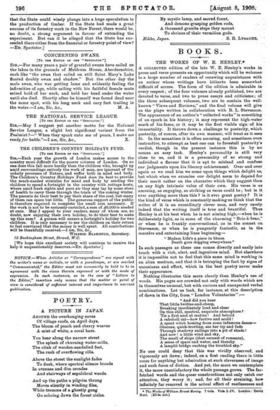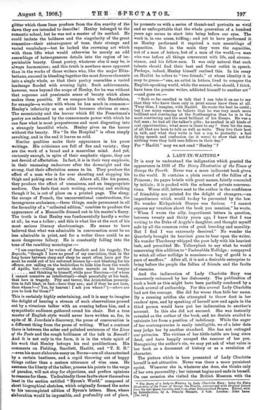BOOKS.
THE WORKS OF W. E. HENLEY.*
A COLLECTED edition of the late W. E. Henley's works in prose and verse presents an opportunity which will be welcome to a large number of readers of renewing acquaintance with an author whose writings have hitherto been somewhat difficult of access. The form of the edition is admirable in every respect ; of the four volumes already published, two are devoted to verse, and two to prose essays and criticisms ; of the three subsequent volumes, two are to contain the well- known "Views and Reviews," and the final volume will give us the plays written in collaboration with R. L. Stevenson. The appearance of an author's "collected works "is something
of an epoch in his history ; it may represent the high-water mark of his fame, or it may be the first visible sign of his
immortality. It throws down a challenge to posterity, which posterity, of course, after its own manner, will treat as it sees fit. In the meantime it is often amusing, and sometimes even instructive, to attempt as best one can to forestall posterity's verdict, though in the present instance this is by no means an easy task. Henley's personality is still very close to us, and it is a personality of so strong and individual a flavour that it is apt to mislead and confuse our judgments upon his literary achievement. Over and over again as we read him we come upon things which delight us, but which when we examine our delight seem to depend for their merit rather on the character which they suggest than on any high intrinsic value of their own. His verse is as amusing, as engaging, as striking as verse could be ; but is it ever anything more than this P is it ever great poetry ? It is the kind of verse which is constantly making us think that the
writer of it is an exceedingly clever man, and very rarely indeed that the writing itself is true and beautiful. Thus
Henley is at his best when he is not aiming high,—when he is deliberately light, as in some of the charming " Brie-à-brae," or when he is frankly conversational, as in the sonnet on Stevenson, or when he is pungently fantastic, as in the macabre and entertaining lines beginning-
" Madam Life's a piece in bloom Death goes dogging everywhere."
In such passages as these one comes directly and easily into touch with a rich, alert, and ingenious mind. But elsewhere
it is impossible not to feel that this same mind is working in an alien medium, and that it is betraying the fact by signs of uneasiness and effort, which in the best poetry never make
their appearance.
Nothing illustrates this more clearly than Henley's use of words. His pages are crowded not only with words which are in themselves unusual, but with curious and unexpected verbal combinations. Let us look, for instance, at this description of dawn in the City, from "London Voluntaries" :— " And did you hear That little twitter-and-cheep, Breaking inordinately loud and clear
On this still, spectral, exquisite atmosphere P •
'Tis a first nest at matins ! And behold
A rakehell cat—how furtive and acold!
A spent witch homing from some infamous dance—
Obscene, quick-trotting, see her tip and fade
Through shadowy railings into a pit of shade !
And now ! a little wind and sky, The smell of ships (that earnest of romance),
A sense of space and water, and thereby
A lamplit bridge ouching the troubled sky."
No one could deny that this was vividly observed, and vigorously set down ; indeed, on a first reading there is little room for anything but admiration at such cleverness of image and such force of diction. And yet, the more we contemplate it, the more unsatisfactory the whole passage grows. The far- fetched words and the queer constructions not only catch our attention, they worry it ; and, for all their straining, how infinitely far removed is the actual effect of restlessness and * The Works of William Rrnest Henley. 7 vole. Vols. L-IV. London : David Nutt. 1.£2 26. net.]
glitter which these lines produce from the dim suavity of the dawn they are intended to describe! Henley belonged to the romantic school, but he was not a master of its method. He could imitate the boldness and the singularity of the great romantics—their eitravagance of tone, their strange and varied vocabulary—but he lacked the crowning art which with them lifts what would otherwise be merely an odd assemblage of heterogeneous details into the region of im- perishable beauty. Great poetry, whatever else it may be, is always harmonious; and this truth is nowhere more apparent
than in the works of those writers who, like the major Eliza- bethans, succeed in blending together the most diverse elements into a single whole, so that their poetry resembles a varied landscape flooded with evening light. Such achievements, however, were beyond the scope of Henley, for he was without that supreme and passionate sense of beauty which alone makes them possible. If we compare him with Baudelaire, for example—a writer with whom be has much in common—
Henley's inferiority as an artist becomes obvious at once. The eccentricity and the horror which fill the Frenchman's poetry are redeemed by the consummate power with which he can fese what is most preposterous and most disgusting into a strangely beautiful whole. Henley gives us the horror without the beauty. His "In the Hospital" is often simply revolting, and in the end it leaves us cold.
Similar qualities make their appearance in his prose writings. His criticisms are full of fire and variety ; they
are the work of a broad and a masculine mind. And yet, curiously enough, in spite of their emphatic vigour, they are not devoid of affectation. In fact, it is in their very emphasis, in their unceasing endeavour after the downright and the strong, that their affectation seems to lie. They produce the effect of a man who is for ever shouting and slapping his thigh and poking one in the ribs. Above all, like his poems, they produce the effect of uneasiness, and an inappropriate medium. One feels that such writing, amusing and striking though it be, is out of place on a printed page. The slang, the scraps of French, the unconventional constructions, the incongruous archaisms,—these things, made permanent in all
the formality of a "collected edition," combine to produce the appearance of a Mascarille dressed out in his master's finery. The truth is that Henley was fundamentally hardly a writer at all; he was a talker ; and this is what lies at the root of his most serious literary shortcomings. He seems to have believed that what was admirable in conversation must be no less admirable in print, and for a writer there could be no more dangerous fallacy. He is constantly falling into the tone of the rambling monologue :—
"I am convinced," he writes of Smollett and his tragedy, The Regicide, "though I have no proof of my conviction, that in the long hours between sleep and sleep he must often have got the most he could out of his enforced leisure by—not blushing for his offence, nor calling on the bedclothes to hide him from the wrath of Apollo, but—rolling certain choice morsels on his tongue and thinking to himself, while poor Narcissa—(of whom I cannot conceive as intellectual)—slept peacefully at his back, that here is tragedy. Pity and terror, the Aristotelian prescrip- tion in full blast, in fact—here they are ; and if they be not here, then where ?—(' Yes, by heaven ! I ask you where ?1—where are you to look for them ? "
This is certainly highly entertaining, and it is easy to imagine the delight of hearing a stream of such observations poured
out by a vivacious talker with an evening before him, and a sympathetic audience gathered round his chair. But a true
master of English style would never have written so, for, in spite of M. Jourdain's discovery, the prose of conversation is a different thing from the prose of writing. What a contrast there is between the sober and polished sentences of the Lives of the Poets and the rough brilliance of the talk in Boswell! And it is not only in the form, it is in the whole spirit of
his work that Henley betrays his real predilections. His comments on Fielding, Smollett, Hazlitt, and "P. E. B." —even his more elaborate essay on Burns—are all characterised by a certain hastiness, and a rapid throwing out of happy things rather than a mature utterance of wise ones. He assumes the liberty of the talker, presses his points to the verge of paradox, will not stop for objections, and prefers opinions to reasons for them. Undoubtedly these faults show themselves
least in the section entitled " Byron's World," composed of short biographical sketches, which originally formed the notes to his 'uncompleted edition of Byron's letters. Here, where elaboration would be impossible, and profundity out of place, he preeents us with a series of thumb-nail portraits so vivid and so unforgettable that the whole generation of a hundred' years ago seems to start into being before our eyes. The work is, in one sense, trifling; and yet to have performed it as Henley performed it required a rare assemblage of
capacities. But in the main they were the capacities, not of a man of letters, but of a man of the world,—a man who was before all things conversant with life, and circum- stance, and his fellow-men. It was only natural that such talents should find their best and freest outlet in speech. Perhaps, indeed, Henley himself realised this. In his essay on Hazlitt he refers to "two friends," at whose identity it is easy to guess—" one, an artist in letters, lived to conquer the English-speaking world, while the second, who should, I think, have been the greater writer, addicted himself to another art" —and goes on :—
" Both so far excelled in talk that I can take it on me to say that they who know them only in print scarce know them at all. 'Twas thus, I imagine, with Hazlitt. He wrote the beat he could ; but I see many reasons to believe that he was very much more brilliant and convincing at the Southampton than he is in the most convincing and the most brilliant of his Essays. He was a full man ; he had all the talker's gifts ; he exulted in all kinds of oral opportunities ; what more is there to say ? Sure 'tie the ease, of all that are born to talk as well as write. They live their best in talk, and what they write is but a sop to posterity : a last dying speech and confession (as it were) to show that not for nothing were they held rare fellows in their day."
For " Hazlitt " may we not read "Henley "P



































 Previous page
Previous page